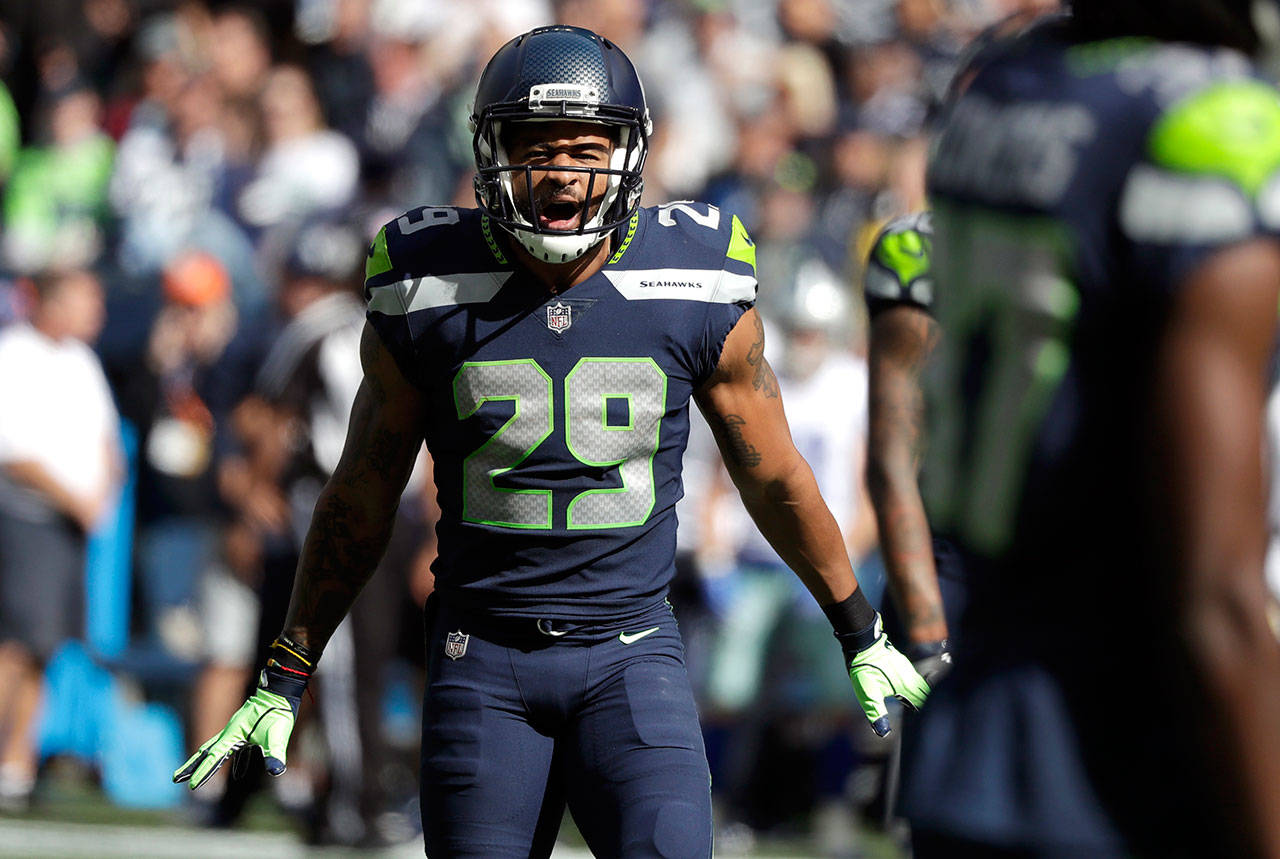Good thing Earl Thomas didn’t retire when he first thought about it.
After breaking his leg in a December 2016 home game against Carolina, the Seattle Seahawks’ all-world free safety startle-tweeted from the halftime locker room:
“This game has been so good to me no regrets. A lot is running through my mind including retirement thanks for all the prayers.”
After the stun faded, teammates and coaches quickly dismissed Thomas’s retirement suggestion as an impulse after the first serious injury of his football life.
“All of us consider retirement just about every game,” Richard Sherman said. “And when you get an injury like that, a lot of stuff goes through your mind.
“I would think it’s a little bit of an exaggeration.”
The description proved true. Fortunately, for all.
Had he acted on his impulse, he would have missed out on his big day Wednesday: A free agent signing with the Baltimore Ravens for four years, worth up to $55 million, with a whopping $32 million guaranteed.
After a tumultuous 15 months in which he told a rival coach to “come get me,” held out of training camp and preseason, then played well, only to break his other leg and abruptly offer his public goodbye to club management with a middle finger seen around the world, the hard feelings evolved into the softest of landings for Thomas.
As free agency approached, Thomas insisted — again sounding impulsive — that his third contract be the best in the NFL for his position despite being 30 in the fall, and coming off injury. The Ravens’ offer came close enough — the deal Washington just gave Landon Collins was worth up to $84 million over six years, also $32 million guaranteed, for a player five years younger — that Thomas can call it whatever he likes and no one will care.
Even though the free agent market for safeties became crowded with top talents, his strategy won the day. The Seahawks are likely left with a third-round compensatory draft choice in 2020 and the knowledge that, given other big contract priorities, the bosses could not have afforded Thomas even if they wanted to.
But coach Pete Carroll and general manager John Schneider didn’t want to, just as they didn’t want to with Sherman and Marshawn Lynch, stars like Thomas who still had game left.
All three were integral in advancing the Seahawks to the NFL’s top shelf, and all three ended their Seattle careers after conflicts with management primarily over money.
That’s the way it works across the NFL. Players want their history of success to be rewarded, and teams are equally insistent that rosters, in an industry with a hard salary cap, perpetually must get younger and cheaper.
We’ll likely never know with each star what factor was paramount — age, health, money or truculence — that led to their departures. We do know that the Seahawks don’t want another episode like Kam Chancellor’s, where an injury following a third contract sticks them for multiple years with a sunk cost for a player in decline.
More room under the cap allows the Seahawks to do things like solve their place-kicking problem, which they did Wednesday when they signed fifth-year pro Jason Myers to a four-year deal for $15.5 million, with $7 million guaranteed, according to the New York Daily News.
After dithering on the cheap with kickers Blair Walsh in 2017 and Sebastian Janikowski in 2018, the Seahawks spent for the top guy on the market. A $4 million annual average is a lot for a kicker, but one rationale stands out: Myers, whom the Seahawks cut in preseason and was hired by the Jets, was good on an NFL-record five field goals of 55 yards or longer this past season.
The Seahawks last season lost four games by three points or less, including the playoff game 24-22 at Dallas, where Janikowski missed from 57 yards just before halftime. A made field goal there would have been worth $4 million by itself.
Hiring a long-distance kicker in his proven prime at 27 (he hit on 33 of 36 field goal attempts to lead the league in percentage) means points on several drives every season that would be otherwise scoreless. Smart move.
The departure of Thomas has deeper significance for other pending decisions: Whether to extend linebacker Bobby Wagner as he enters his contract year, the same situation the Seahawks face with quarterback Russell Wilson and defensive tackle Jarran Reed. And pass-rushing defensive end Frank Clark has yet to sign his franchise tag, in hopes of getting a long-term extension.
While Wilson’s future merits most attention and is a world nearly unto itself, Wagner, 29 in June, is nearly as important to the defense as Wilson is to the offense. Reed is 26, as is Clark in June. The three are the future of the defense. Devoting cap room to their deals that otherwise could have gone to Thomas makes more sense.
As much as Thomas has meant to the Seahawks as a once-a-decade safety on par with the NFL’s best in Kenny Easley, Ronnie Lott, Troy Polamalu and Ed Reed, there is a simple way to see it: His decade has come to pass.
He was splendid. Health permitting, he’ll be great for the Ravens. Glad he talked himself out of retiring.
Art Thiel is co-founder at sportspressnw.com
Talk to us
> Give us your news tips.
> Send us a letter to the editor.
> More Herald contact information.

























